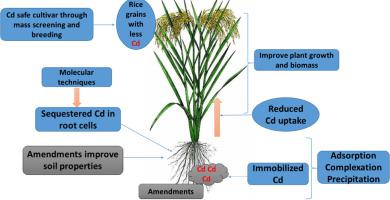Science of the Total Environment ( IF 8.2 ) Pub Date : 2020-09-07 , DOI: 10.1016/j.scitotenv.2020.142188 Babar Hussain , Muhammad Nadeem Ashraf , Shafeeq-ur-Rahman , Aqleem Abbas , Jumei Li , Muhammad Farooq

|
Cadmium (Cd) toxicity in paddy soil and accumulation in rice plants and grains have got global concern due to its health effects. This review highlights the effects of soil factors including soil organic matter, soil pH, redox potential, and soil microbes which influencing Cd uptake by rice plant. Therefore, a comprehensive review of innovative and environmentally friendly management practices for managing Cd stress in rice is lacking. Thus, this review discusses the effect of Cd toxicity in rice and describes management strategies to offset its effects. Moreover, future research thrusts to reduce its uptake by rice has also been highlighted. Through phytoremediation, Cd may be extracted and stabilized in the soil while through microbes Cd can be sequestrated inside the microbial bodies. Increased Cd uptake in hyperaccumulator plants to remediate and convert the toxic form of Cd into non-toxic forms. While in chemical remediation, Cd can be washed out, immobilized and stabilized in the soil through chemical amendments. The organic amendments may help through an increase in soil pH, adsorption in its functional groups, the formation of complexations, and the conversion of exchangeable to residual forms. Developing rice genotypes with restricted Cd uptake and reduced accumulation in grain through conventional and marker-assisted breeding are fundamental keys for safe rice production. In this regard, the use of molecular techniques including identification of QTLs, CRISPR/Cas9, and functional genomics may be quite helpful.
中文翻译:

稻田镉胁迫:土壤条件和修复策略的影响
稻田土壤中的镉(Cd)毒性以及水稻植物和谷物中的镉积累由于其健康影响而备受全球关注。这篇综述强调了土壤因素的影响,包括土壤有机质,土壤pH,氧化还原电势和土壤微生物,这些影响水稻植物对镉的吸收。因此,缺乏对用于管理水稻中Cd胁迫的创新和环保管理方法的全面审查。因此,本综述讨论了镉对水稻毒性的影响并描述了抵消其影响的管理策略。此外,还强调了未来的研究方向以减少其对大米的吸收。通过植物修复,可将Cd提取并稳定在土壤中,而通过微生物将Cd隔离在微生物体内。高蓄积植物中Cd吸收增加,以补救Cd的有毒形式并将其转化为无毒形式。在化学修复过程中,可通过化学改良剂将镉洗出,固定并稳定在土壤中。有机改性剂可通过提高土壤pH值,吸附其官能团,形成络合物以及将可交换形式转化为残留形式而有所帮助。通过常规育种和标记辅助育种,开发出具有限制镉吸收和减少谷物积累的水稻基因型,是确保水稻安全生产的根本关键。在这方面,使用分子技术,包括鉴定QTL,CRISPR / Cas9和功能基因组学可能会很有帮助。通过化学修饰固定并稳定在土壤中。有机改性剂可通过提高土壤pH值,吸附其官能团,形成络合物以及将可交换形式转化为残留形式而有所帮助。通过常规育种和标记辅助育种,开发出具有限制镉吸收和减少谷物积累的水稻基因型,是确保水稻安全生产的根本关键。在这方面,使用分子技术,包括鉴定QTL,CRISPR / Cas9和功能基因组学可能会很有帮助。通过化学修饰固定并稳定在土壤中。有机改性剂可通过提高土壤pH值,吸附其官能团,形成络合物以及将可交换形式转化为残留形式而有所帮助。通过常规育种和标记辅助育种,开发出具有限制镉吸收和减少谷物积累的水稻基因型,是确保水稻安全生产的根本关键。在这方面,使用分子技术,包括鉴定QTL,CRISPR / Cas9和功能基因组学可能会很有帮助。通过常规育种和标记辅助育种,开发出具有限制镉吸收和减少谷物积累的水稻基因型,是确保水稻安全生产的根本关键。在这方面,使用分子技术,包括鉴定QTL,CRISPR / Cas9和功能基因组学可能会很有帮助。通过常规育种和标记辅助育种,开发出具有限制镉吸收和减少谷物积累的水稻基因型,是确保水稻安全生产的根本关键。在这方面,使用分子技术,包括鉴定QTL,CRISPR / Cas9和功能基因组学可能会很有帮助。





















































 京公网安备 11010802027423号
京公网安备 11010802027423号